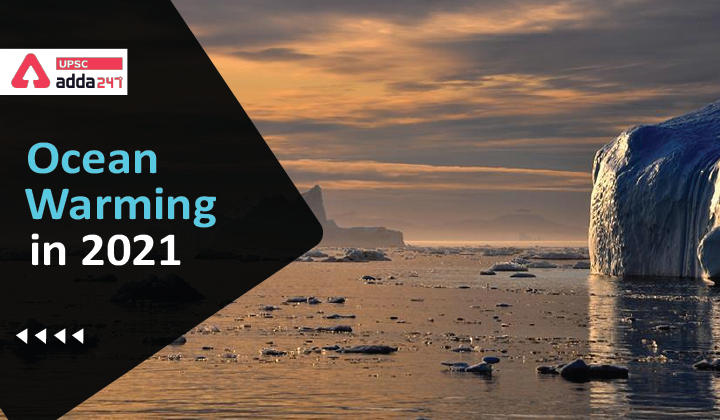Table of Contents
Ocean warming in 2021: Relevance
- GS 3: Conservation, environmental pollution and degradation, environmental impact assessment.
Ocean warming in 2021: Context
- According to the recently published analysis in the Advances in Atmospheric Sciences journal, world’s oceans underwent record warming in 2021.
Record Ocean warming in 2021: Key points
- The report has stated that, the upper 2,000 metres of the ocean absorbed 235 zettajoules (ZJ) of heat in 2021 relative to the 1981-2010 average.
- The sum of the energy used by humans across the world in a single year is about half a ZJ (one ZJ is equal to 10^21 joules).
- The warming rates in 1986-2021 represents a maximum eight-fold increase compared to 1958–85.
Ocean warming in 2021: How oceans heat up?
- Oceans stabilise Earth’s climate by absorbing large amounts of heat from sunlight, water vapour and other greenhouse gases.
- The heat absorbed by the oceans find its way back into the atmosphere through melting ice shelves, evaporating water or directly reheating the atmosphere.
- If the ocean absorbs more heat than it releases, its heat content rises.
- Oceans are absorbing most of the heating from human carbon emissions like carbon dioxide and other greenhouse gases, due to which there is an energy imbalance.
- The experts have stated that the heating of ocean will continue until we reach net-zero carbon emissions.
Ocean warming in 2021: Impact of El Niño and La Niña
- During El Niño, the oceans release some amount of heat, contributing to a mini global warming. So, the warmest years in terms of surface temperature are El Niño years.
- During La Niña, oceans take up heat and bury it at depths away from the surface.
- Expert is of the opinion that this amount of energy is huge for the atmosphere, but the cumulative effect on ocean warming is much less.
Record Ocean warming in 2021: Effect on coastal communities
- Melting ice accelerates sea-level rise. Also, as oceans heat up, water expands (thermal expansion of water). This leads to an increase in the volume of water.
- Warmer oceans also supercharge weather systems, creating more powerful storms and hurricanes, as well as increasing precipitation and flood risk.
- The experts recommended that the coastal communities need to modify engineering designs, building codes and coastal development plans to tackle increased sea-level rise, as they are the first to bear the brunt of sea-level change.
Record Ocean warming in 2021: Effect on marine life
- Warming oceans could result in increased ocean stratification or separation, causing less mixing of the ocean layers.
- It means that heat, oxygen and carbon dioxide are not transported from the surface to the oceanic depths. It affects the marine life in the aphotic zones and the benthic zone.
AlsoRead:





 TSPSC Group 1 Question Paper 2024, Downl...
TSPSC Group 1 Question Paper 2024, Downl...
 TSPSC Group 1 Answer key 2024 Out, Downl...
TSPSC Group 1 Answer key 2024 Out, Downl...
 Cabinet Ministers of India 2024, New Cab...
Cabinet Ministers of India 2024, New Cab...







